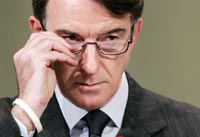Russia's politics must resolve stumbling blocks to join WTO

Moscow’s politics can resolve the remaining stumbling blocks to Russia joining the World Trade Organization, according to EU's trade chief.
EU Trade Commissioner Peter Mandelson said some Russians were questioning whether accepting international trade rules and reducing state control over business was a worthwhile trade-off.
He insisted it was and that Russia's WTO entry would help smooth nagging trade disputes with Europe over Polish meat and Russian timber exports.
"Issues like these should not be allowed to dominate our relationship," Mandelson said in prepared remarks for a speech to a conference in Brussels.
"Our urgent challenge is to get fundamentals like WTO membership in place so that we have the necessary ballast to handle a frank and constructive relationship on our shared neighborhood and collective future without being capsized by each little trade or political storm," he said.
Joining the WTO would help stabilize Russia's trading relationship with partners and encourage it to diversify its economy away from the oil and natural gas - and their fluctuating prices - that dominate exports to Europe, its main market.
Mandelson said he hoped Russian President Vladimir Putin would finalize the country's steps toward the WTO and fix trade issues with Europe that have held up the signing of an EU-Russia trade deal before his scheduled departure from the presidency next year.
"We should strive to resolve the remaining issues between us ahead of next week's EU-Russia summit in Mafra (Portugal)," he said.
Failure to sort out the ground rules means the political machinery of the EU-Russia relationship repeatedly snarls up on the details.
Europe's relationship with Russia has become more complicated since former Soviet bloc countries such as Poland joined the European Union in 2004, Mandelson said.
Poland has blocked an EU agreement with Russia over its boycott of Polish meat exports, which Russia says it is concerned are not safe. The EU executive supports Warsaw, saying food safety experts see the Russian ban as unwarranted.
Another Russian neighbor, Finland, is complaining about charges Russia plans to slap on wood exports that would raise costs for Finnish paper makers.
And the Baltic state of Estonia raised Russian hackles by moving a memorial to Soviet World War II soldiers.
Mandelson suggested Russia and Europe's many different national interests could benefit from creating a formal dialogue between traders on both sides to tease out economic priorities in trade, investment and energy.
"Such a body could service our summit meetings and allow these to focus on the larger picture and the overall relationship," he said.
Subscribe to Pravda.Ru Telegram channel, Facebook, RSS!


